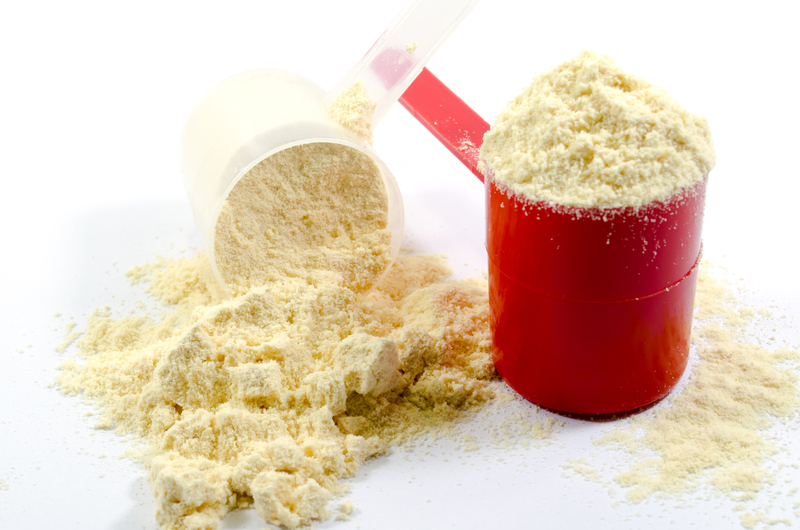You’ve likely heard that you should use protein powder for weight loss. Learn why it is a common recommendation and the how to choose the right protein powder for you.
As you know, there are so many different elements that can impact your weight loss journey – from the food that you eat, to your exercise routine, to your sleep habits, and more. Plus, the distribution of protein, the carbohydrates, and the fat can impact body composition during your weight loss efforts.
Specifically, it is recommended to increase protein intake during calorie restriction to reduce the loss of lean body mass (muscle) so that the body can focus on burning fat. So, as you can imagine, making sure you’re getting enough protein, and focusing on the sources of your protein matters!
While I always have a food-first approach, there are times where it can be difficult to meet your protein needs from food alone. Plus, protein powders can be a convenient option when you want a quick protein-packed meal. So, let’s take a closer look at what the research says, the different types of protein powder, and the best protein powders for weight loss that I recommend to my clients.
Does Protein Powder Help You Lose Weight?
What’s vital to remember when trying to lose weight is that you need to consume less food than your body is burning. However, when you do this, your body loses fat, but you are at risk for losing muscle as well.
This, in turn, leads to a slower metabolism which stalls your long-term weight loss and muscle weakness, and can also hinder your exercise. Therefore, you must consume more protein than usual when in a calorie deficit to preserve your lean body mass. Protein powder can help you lose weight if it is helping to contribute to your protein intake while still staying within a calorie deficit.
Another important thing to note is that a scientific review found that consuming protein powder with your meals, rather than as a separate snack, can be more effective for weight loss. This is primarily due to the total intake of calories, and how the snack may add additional intake in the day.
So, Is Protein Powder Good for Weight Loss?
It absolutely can have its place in your weight loss efforts. However, don’t buy protein powder with the thought that it is going to be the golden ticket. Your food choices and behaviors are the bottleneck for the rest!
Research shows that a person looking to lose about a pound of fat a week should consume at between 0.6-0.7 grams of protein per pound of body weight. This is almost double what the recommended amount of protein is for the average American. For someone that weighs 175 pounds, that is 105-123g of protein per day.
So how in the world can one eat all that protein? And vegetarians? Vegans? This is where protein supplements can come to the rescue.
How to Choose Protein Powder for Weight Loss
Consider the following when choosing your protein powder:
- The type of protein – ie. whey, casein, rice, pea, plant protein mix, etc.
- The amino acid composition – Is it lacking in any key amino acids? Does it contain the three BCAAS? Does it have over 2-3 grams of leucine (leucine is a trigger for muscle building)?
- Look at the ingredients – Make sure there aren’t a lot of added fillers or unnecessary ingredients.
- Look at the nutrition panel – Be mindful of the serving size, calories, carbohydrates, and fat in addition to the protein so that you know how the powder fits into your daily intake.
- Cost – The cost of protein powders can vary widely.
Not all protein powders are created equal. Based on your goals, the amino acids (the building blocks of protein) can make quite a difference. For example, collagen may be great for the potential skin and joint benefits, but there is minimal leucine in collagen. Choosing whey or a plant-based blend can ensure you meet the leucine threshold for muscle building or maintenance.
How to Use Protein Powder for Weight Loss
There are three main things I recommend keeping in mind for using protein powder for weight loss:
- it should not replace whole foods – it is a supplement to what you’re already eating
- protein powders can be a convenient way to close the gap in your protein intake versus your protein needs
- the timing of your protein intake, and how much you consume at one sitting matters
With all of that in mind, here is a list of some of the most common protein powders on the market.

Whey Protein Powder
Whey is the liquid protein in milk and is a potent protein source when isolated. It is often the most popular among protein supplements because it has been proven to stimulate muscle growth. This is due to its composition of all of the essential amino acids (including the branched chain amino acids), and how quickly your body is able to absorb it.
Out of all the protein powders, whey protein has the highest amount of leucine by volume, which has also been proven to support muscle growth in the body.
Research About Whey
One scientific review noted that there are hopeful benefits of whey protein supplementation on the impact it has for decreased body weight and fat mass. Another scientific review looking at whey supplementation on body composition in women found that the most beneficial effects occurred when taken in combination with resistance training and energy restriction. Whey protein given after resistance training has also shown to decrease body fat.
Casein Protein Powder
Casein is the main protein found in milk. The debate is still ongoing as to whether casein is just as effective as whey at building muscle, but it is definitely a great choice as a general protein supplement when you need to get your protein in throughout the day and don’t have time for a meal.
Due to the fact that it is a slower digested protein, research is more closely examining the impact of consuming casein before bedtime. It is proposed to increase muscle protein synthesis and metabolic rate overnight, which could have a beneficial effect on weight loss.
Soy Protein Powder
Soy protein powder is efficient at stimulating muscle growth despite it coming from plant source, which can be beneficial in maintaining lean body mass when losing weight. Although soybean protein has all the essential amino acids, it has a lower biological value. For example, while egg protein has a biological value of 100, soybean protein has a biological value of 74.
While soy used to be seen as an inferior protein, research has been revealing that surprisingly, soy protein powder can be just as effective as whey protein on gains in lean body mass with resistance training. This could be valuable for preserving lean body mass with weight loss.
Rice Protein Powder
Rice protein is another good option for those who do not consume animal products or have soy allergies. If you want a similar amino acid profile to whey, it is best to buy a blend of plant proteins. Another option is to mix it into your food when cooking so that it is an addition to the amino acids from your other food ingredients.
Pea Protein Powder
When the amino acids of rice and pea are combined, they produce an amino acid profile very similar to whey. Additionally, pea protein is particularly high in leucine. Therefore, both options are good choices for those who do not consume animal products, are gluten-free, or are dairy and soy sensitive. So, if you are planning to use pea or rice protein powders is probably best to combine the two.
What is the Best Protein Powder for Weight Loss?
Research has shown that plant based proteins and mixes (including soy, pea, and rice proteins) can be just as effective as whey for maintaining or building muscle mass, which is an important part of a healthy weight loss approach.
Out of all these protein powder types, I typically recommend whey protein for weight loss due to its natural composition of essential and branched chain amino acids and its cost.
My Top 5 Recommended Protein Powders
Many of my clients ask for protein recommendations, and here are the top ones I typically recommend:
- Designer Whey
- Gold Standard Whey
- Body Fortress Whey
- 365 Whey (Whole Foods Brand)
- Orgain Plant-Based Protein
- Vega Pea Protein
- Trader Joes Pea Protein Powder
- Premium Plant Protein Pure Rice Protein Powder by Growing Naturals
So, there you have it! It is important to remember that protein supplements can be a great accessory for your weight loss efforts, but your total calorie and protein intake should be two things for you to consider first. Try to get your protein from lean sources of protein whenever possible and use protein supplements as needed.
Want more guidance for individualized protein recommendations and weight loss tips? View my 3-month weight loss package.





